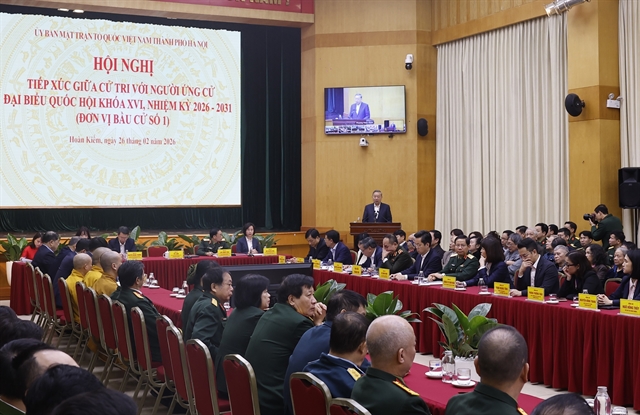 Economy
Economy

Vietnamese enterprises, especially small- and medium-sized ones, need greater awareness of the importance of brands and developing them to competitiveness, a seminar heard in HCM City yesterday.
| ||
| Seth Hay, chief representative of the International Trademark Association, answers questions from participants at the Brand in Relation to Strategies of Enterprise Development seminar held in HCM City on February 26. — Photo courtesy of the organisers |
HCM CITY — Vietnamese enterprises, especially small- and medium-sized ones, need greater awareness of the importance of brands and developing them to competitiveness, a seminar heard in HCM City yesterday.
Assoc Prof Dr Mai Hà, chairman of the Việt Nam Intellectual Property Association (VIPA), told the Brand in Relation to Strategies of Enterprise Development seminar: “Brand is among intangible assets of enterprises and a core value in creating enterprises’ value.”
However, Vietnamese enterprises had not paid much attention to the value of brands, he added.
According to Lương Minh Huân, deputy director of the Việt Nam Chamber of Commerce and Industry’s Enterprises Development Institute, brand building is not only a key factor in facilitating exports and helping businesses compete but also establishes the reputation and brand of a country.
Việt Nam is among the largest exporters of agricultural products, but not many foreign consumers know they are using products from Việt Nam.
That is because the products are exported without brand names on the packaging.
Hà said: “We are worried that with growing international integration, enterprises face fierce competition. They will also face brand disputes, and if this happens, they will surely lose.”
To succeed, local enterprises, especially exporters, must focus on building their own brands right while starting their business, he added.
Peter Willimott of the World Intellectual Property Organisation said unlike tangible assets brands appreciate with time if enterprises make proper investment in them.
Johnathan Ooi, deputy general director of PwC Vietnam Limited’s valuation division, said: “Brands are one of the most important and valuable assets that businesses need to nurture and protect.
“A good brand builds customers’ trust in the products and services of a company. Thus, it will increase its revenue and profits.”
In addition, a good brand would attract more talent, one of the most important factors for a company’s success, and build suppliers’ trust, and this enhances a company’s competitiveness in the market, he said.
In an interview with the media, Seth Hay, chief representative of the International Trademark Association (INTA), said, “Vietnamese companies need to pay attention to the three Ps: be prepared, be proactive, and be positive about brand development.
“Being prepared means they need to register their trademarks in Việt Nam as well as outside Việt Nam. Being proactive means they need to set aside the money to make sure they protect the brand and prevent others from using it. Being positive means they need to go out and value their brands and think that a brand is a revenue generator, a brand can be licensed and can be used for loans and other assets.”
INTA’s research shows a strong relationship between economic growth and trademark-intensive industries.
In developed countries trademark-intensive industries could contribute over 50 per cent to GDP, while in developing countries it could be 25 per cent.
A company’s bosses “need to understand the importance of brands and pay attention to brands and invest in brands,” Hay added.
Global regulation
The seminar also discussed global regulatory trends undermining the future of brands, called the “slippery slope”.
It refers to the trend of applying restrictions first to tobacco and then to other consumer products such as alcohol and foods akin to a domino effect.
Measures such as taxation, pictorial health warnings, restrictions or prohibitions on advertising and promotion, and regulations on the product itself are increasingly being proposed and introduced on other products such as alcohol, soft drinks and foods.
One of its outcomes is plain packaging, which has major ramifications for other consumer goods because it could be extended to any product under increased regulatory scrutiny.
Paul Middleton, corporate development director at Japan Tobacco International, said: “Plain packaging has serious economic consequences: it distorts market dynamics, specifically damaging within-price-segment competition and ultimately generates down-trading to the value end of the market. It also increases illicit trade leading to significant reduction in tax collected by governments.”
The seminar was organised by VCCI, the VIPA, IPA-HCM City, INTA and the inspectorate of the Ministry of Science and Technology. — VNS




